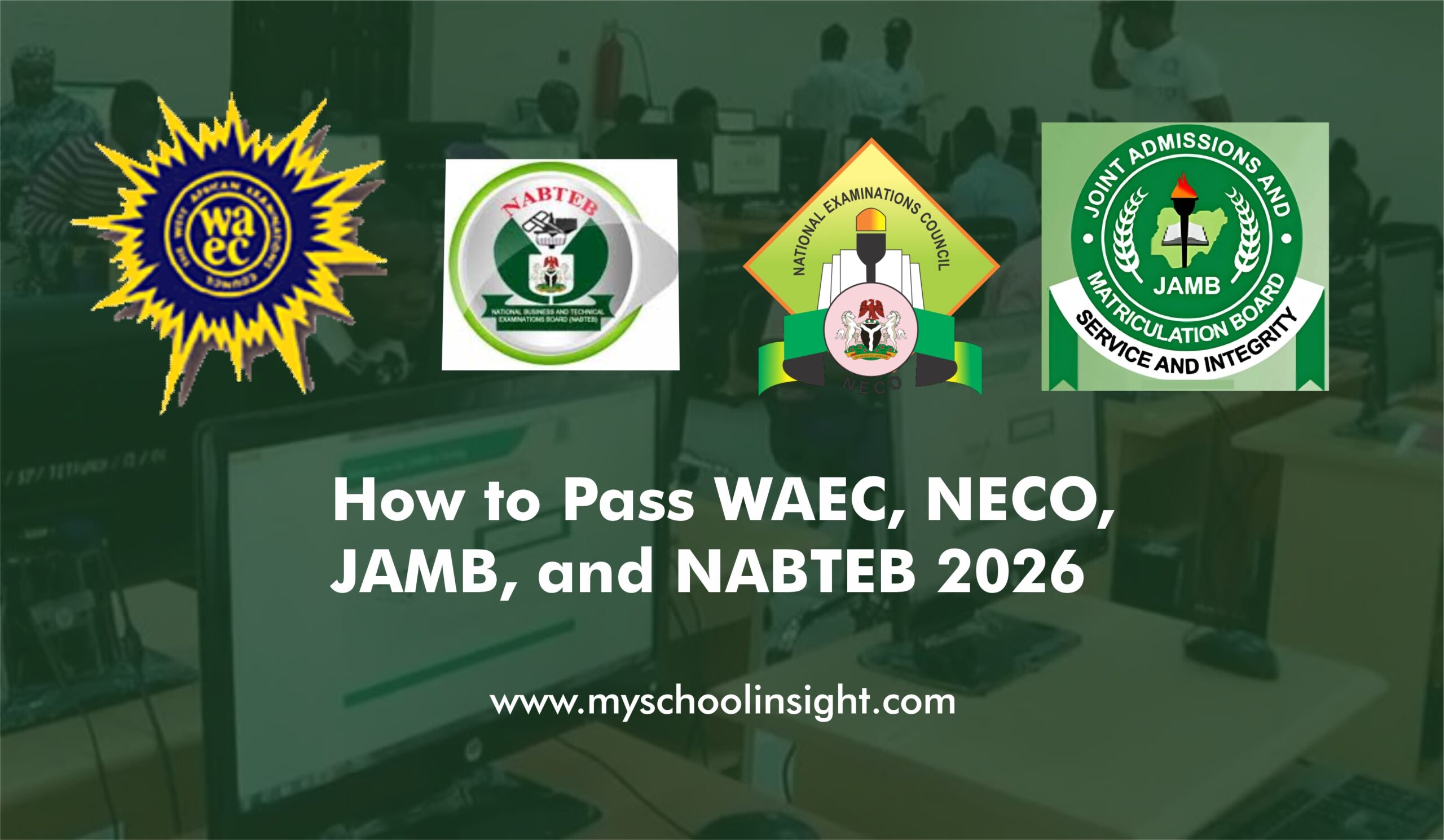How to Pass WAEC, NECO, JAMB, and NABTEB 2026

It is the only thing that every secondary school student in Nigeria dreams of; passing the WAEC, NECO, JAMB or NABTEB exams in one sitting and proceeding to the university or whatever his next stage in life is. These are not simple exams, yet they can be passed. Every year thousands of students graduate and you can do the same.
Passing isn’t about luck. It has got to do with knowing how these exams operate, planning and setting with focus and applying the appropriate strategies in time. This paper will take you step-by-step through all you need to know: how to read efficiently, time management, past questions, motivation, and the pitfalls that see many candidates end up.
And you begin now, you prepare to 2026, not only will you pass, but you will pass with brilliance.
Know What Each Exam Really Means
Before you start studying, you must understand what you’re preparing for. Each exam tests something different, and knowing this helps you plan your reading correctly.
WAEC – West African Examinations Council
WAEC is the large secondary school leaving exam that is undertaken in West Africa. It challenges your expertise in major and minor courses. The test contains and the objectives (multiple choice), theory, and occasionally practice such as science courses. What most employers and universities look at is your WAEC result.
NECO – National Examinations Council
NECO is similar to WAEC but organized solely within Nigeria. Some schools prefer NECO because the marking is often fairer and results come faster. Having good NECO grades gives you the same advantage as WAEC when applying for admission.
JAMB – Joint Admissions and Matriculation Board
The UTME (Unified Tertiary Matriculation Examination) which JAMB administers is a computer based exam necessary to gain access to universities, poly-techniques, and colleges of education. It is oriented to four subjects English Language and three more connected to your preferred course. The score set by JAMB is what determines whether you are admitted or not, and therefore, it is very crucial.
NABTEB – National Business and Technical Examinations Board
NABTEB is meant for students in technical and vocational schools. It focuses more on practical skills and technical subjects but is still accepted for university or polytechnic admission.
Get the Official 2026 Syllabus and Plan Your Studies
Many students fail not because they aren’t smart, but because they don’t know what to study. The syllabus is your exam map — it shows you exactly what topics each exam will cover. Without it, you’re walking in the dark.
Why the Syllabus Matters
Every question in WAEC, NECO, JAMB, and NABTEB comes directly from the syllabus. Examiners don’t just set random questions — they pull them from the specific topics listed for that year.
If you read outside the syllabus, you waste time on things that won’t appear.
By using the syllabus:
- You’ll study what truly matters.
- You’ll avoid skipping key topics.
- You’ll notice patterns in repeated areas.
- You’ll prepare more confidently and efficiently.
Where to Get the 2026 Syllabuses
You can get them easily online or from your school:
- WAEC syllabus: Available from your school or download free online (official WAEC website or trusted education blogs).
- NECO syllabus: Usually provided by teachers, or available in PDF form online.
- JAMB syllabus: Free inside the JAMB CBT practice app or on the official JAMB website (jamb.gov.ng).
- NABTEB syllabus: Accessible from nabteb.gov.ng or any authorized NABTEB center.
How to Use the Syllabus Effectively
- Break it down — Don’t try to read everything at once. Divide the topics into weekly goals.
- Highlight key areas — Focus on topics that have appeared often in past questions.
- Create a checklist — Tick off topics as you complete them to track progress.
- Combine with past questions — After reading a topic, test yourself using questions from that area.
Make a Realistic Study Plan
Once you know what to study, build a plan that fits your daily schedule. Don’t just say, “I’ll read later.” Write down what, when, and how long you’ll study each day.
Here’s a simple example:
| Day | Subject | Time | Focus Area |
|---|---|---|---|
| Monday | English Language | 4:00pm – 6:00pm | Comprehension and Essay Writing |
| Tuesday | Mathematics | 4:00pm – 6:30pm | Algebra and Quadratic Equations |
| Wednesday | Biology | 4:00pm – 6:00pm | Cell Structure & Functions |
| Thursday | Economics | 4:00pm – 6:00pm | Demand and Supply |
| Friday | Revision | 5:00pm – 6:30pm | Past Questions Practice |
It’s better to study a little every day than to overload yourself once a week. The brain remembers through consistency, not cramming.
Use Past Questions as a Secret Weapon
If you want to pass WAEC, NECO, JAMB, or NABTEB 2026 easily, you must practice past questions — lots of them.
This is one of the most powerful strategies students use to score high grades.
Why Past Questions Are So Important
- Exam bodies often repeat or reframe old questions.
For example, a 2018 question might reappear in 2024 with slightly different wording. - They help you understand the exam style.
You’ll know the type of questions to expect, whether they’re theory, objective, or calculation-based. - They teach you time management.
Practicing under exam conditions helps you write faster and think clearly. - They boost confidence.
When you solve questions successfully, you stop fearing the exam.
How to Practice Past Questions the Right Way
- Start early. Don’t wait until a few weeks to the exam. Begin months ahead.
- Study by topic. Read a topic first, then solve past questions from that topic.
- Set a timer. Try to finish each paper within the official exam duration.
- Mark and correct yourself. Learn from your mistakes — don’t just check answers, understand them.
- Use verified materials. Avoid fake or poorly solved past questions — always use trusted sources.
Best Past Question Sources
- WAEC and NECO: Printed compilations sold in bookshops or digital copies online.
- JAMB: Use the JAMB CBT mobile app — it gives instant feedback and real exam simulation.
- NABTEB: Official practice books and question collections from previous years.
Tip: When you study 10 years’ worth of past questions, you’ll see the same ideas repeating in different forms. That’s the easiest way to predict what’s coming.
Create a Smart Reading Timetable and Stick to It
You’ve probably heard the saying, “Failing to plan is planning to fail.” Well, the same applies to exam preparation. If you don’t have a proper study plan, you’ll find yourself scrambling at the last minute. Having a study timetable is like having a roadmap to success. It helps you stay focused, organized, and on track.
Why You Need a Study Timetable
A well-organized timetable ensures that you:
- Don’t miss any important topics.
- Allocate time to your weak areas.
- Balance study with relaxation, so you don’t burn out.
- Develop a steady routine and consistency.
Without a timetable, you might end up studying the wrong subjects at the wrong time or skipping some important topics entirely. Time management is key in maximizing your study efforts.
Steps to Create a Study Timetable
- Assess your current schedule
Look at your daily life. Consider your school hours, family commitments, and other responsibilities. How much time can you realistically dedicate to studying every day?
Aim for 3-4 hours per day during the week (longer on weekends), but don’t forget to give yourself time to rest. - Prioritize your subjects
Some subjects will need more time than others. For example, if you struggle with Mathematics or English, allocate extra time to practice those subjects.
List your subjects in order of importance:- Core subjects (like Mathematics, English, and Science)
- Electives (like Geography, History, etc.)
- Weaker areas that need more focus
- Be specific about your focus
Don’t just say “study Mathematics” — break it down further.
For instance:- Monday, 4:00–5:30 PM: Algebra
- Tuesday, 4:00–5:30 PM: Geometry
- Wednesday, 4:00–5:30 PM: Statistics
- Use the 80/20 rule (Pareto Principle)
Focus on the 20% of topics that will give you 80% of the marks. For example, don’t waste days studying long theoretical concepts you already understand. Instead, identify the areas that frequently show up in past questions and focus on those. - Leave time for breaks and revision
Don’t try to read non-stop for hours. Studies show that your brain retains information better when you take regular breaks. For every 1 hour of studying, take a 10-15 minute break.
And don’t forget to revise regularly! Spend the last 30 minutes of your study session going over what you studied earlier in the day. - Stick to your timetable
If you write down your study plan but don’t follow it, you’ll never make progress. Keep your timetable visible (on your wall, in your study area, or on your phone). Hold yourself accountable. Consistency is key.
Master Time Management – Use Your Exam Time Wisely
Time management has been identified as one of the best skills in passing any exam. Whether you are doing JAMB, WAEC, NECO or NABTEB, the time you spend in the examination hall may or may not make your result. Failure to manage your time can make you leave some questions which are easy to answer without an answer or even end up having no time to finish your exam.
How to Manage Time During Your Exam
- Read the Instructions Carefully
This might sound obvious, but many students fail because they don’t pay attention to instructions. Before you start, read all the instructions carefully. If it’s a multiple-choice exam, don’t forget to check the number of questions and whether you need to answer all questions or just a few. - Plan Your Time for Each Section
In WAEC and NECO, exams typically have multiple sections, with both objective and theory questions. Assign time limits for each section before you begin:- Objective questions: 45–60 minutes
- Theory questions: 90 minutes
- Essay questions: 30–45 minutes each (depending on how many essays you need to write)
- You have 2 hours 30 minutes for 4 subjects.
- Allocate 35 minutes per subject.
- Don’t spend more than 1 minute per question (for objective questions). If you can’t answer, move on and come back to it later.
- Start with Your Strongest Section
During your exam, always start with the section you’re most confident about. This helps build momentum. Don’t waste precious minutes on difficult questions in the beginning.
For example, in JAMB, start with English, which is common to all courses, then move on to your major subjects. - Don’t Overthink
It’s easy to get stuck on a tough question. If you can’t figure out the answer in 2 minutes, move on! Trust that you’ll come back to it later. If you waste 10 minutes on one question, that’s 10 minutes you’ll never get back. - Review Before Submitting
Keep the last 10-15 minutes to review your answers, especially for theory papers. Double-check for spelling errors, math calculations, or questions you might have missed.
For JAMB, always ensure you’ve answered all questions before the timer runs out.
Practice Past Questions and Mock Exams
The more you practice, the more you will feel prepared. Doing mock exams and solving past questions is the best way to simulate the exam environment and test your speed and accuracy.
Why Mock Exams and Past Questions Matter
- They help you gauge your readiness
Mock exams give you an accurate idea of what to expect, so you won’t be surprised on exam day. They also help you realize which areas you’re still weak in. - They teach you the right exam technique
You’ll learn how to read questions quickly, manage your time, and stay calm under pressure. - They highlight repeating topics
You’ll notice patterns in how questions are asked. Topics that keep appearing year after year are likely to come up again.
Tips for Practicing Past Questions Effectively
- Solve under timed conditions
Treat it like a real exam. Use a stopwatch or timer and don’t stop until you finish the paper. - Review your mistakes
After solving, don’t just look at the answers — go through the explanations to understand why you got certain questions wrong. - Focus on weak areas
If you struggle with a particular subject, find more past questions on that topic and practice until you feel confident. - Simulate real exam conditions
Take a few mock exams in the same setting you’ll be in on exam day: quiet room, seated at a desk, timed conditions. It’ll help reduce exam stress.
Stay Motivated and Avoid Procrastination
It’s easy to get distracted, especially with all the social media, family, and other things happening around you. But if you want to pass WAEC, NECO, JAMB, or NABTEB, you must stay focused and motivated.
How to Stay Motivated
- Set small, achievable goals
Every day, give yourself something specific to accomplish. Whether it’s completing a chapter or finishing a set of past questions, make sure you check it off once you’re done. - Reward yourself
After achieving a goal, treat yourself. It could be something small, like watching an episode of your favorite show or having your favorite snack. - Visualize success
Imagine yourself on the day you get your results and see that you’ve passed everything in one sitting. Let that vision push you to keep going. - Break large tasks into smaller steps
Studying for 3 hours might seem overwhelming, but if you break it into smaller chunks (45 minutes of focused study, then a 10-minute break), you’ll find it much easier. - Find a study partner or group
If you’re feeling isolated, find a friend or join an online group where you can motivate each other and share study tips.
Don’t Forget to Take Care of Yourself
This one is crucial. Mental and physical health matter just as much as studying. You can’t perform well if you’re exhausted or stressed.
Tips for Taking Care of Yourself
- Get enough sleep (at least 6-8 hours a night).
- Eat healthy meals to keep your brain fueled.
- Exercise regularly to reduce stress and increase focus.
- Avoid too much caffeine or energy drinks, which can make you jittery and anxious.
- Take breaks when you feel overwhelmed. A 10-minute walk or listening to music can recharge you.
Avoid Common Mistakes During Exam Preparation
Every year, students make the same mistakes that lead to poor results — not because they’re not smart, but because they don’t prepare in the right way. By avoiding these common pitfalls, you can ensure your preparation is much more effective.
Common Mistakes to Avoid When Preparing for WAEC, NECO, JAMB, and NABTEB
1. Procrastination
The number one reason students fail to reach their potential is procrastination. Waiting until the last minute to study only adds stress and reduces the time you have to properly learn and revise.
You might think you have “plenty of time,” but exams come faster than you expect.
How to Avoid It:
- Stick to your study timetable and get started early.
- Break down larger tasks into smaller, manageable chunks.
- Set deadlines for completing each topic to keep you on track.
2. Cramming Instead of Consistent Study
Some students think they can learn everything the night before the exam (also known as “cramming”). This rarely works because your brain needs time to absorb and retain information.
While it might help you memorize a few facts in the short term, cramming will only leave you stressed and unprepared for more complex questions.
How to Avoid It:
- Create a consistent study schedule that spreads out your revision over several months.
- Focus on active learning — test yourself regularly and use past questions to reinforce your understanding.
3. Not Practicing Enough Past Questions
You may know the theory, but if you don’t practice solving actual exam questions, you’ll struggle on exam day. Many students fail because they’re unfamiliar with how questions are phrased or structured.
Additionally, they fail to develop the speed needed to finish within the allocated time.
How to Avoid It:
- Make past questions a part of your daily routine.
- Start practicing as early as possible and aim to do at least 1 full mock exam every week.
4. Skipping Topics or Sections
It’s tempting to skip topics you find difficult or boring, but no topic is unimportant. You’re expected to know everything on the syllabus, even if it doesn’t seem “important” to you.
How to Avoid It:
- Ensure you study every topic in the syllabus, even the ones you don’t enjoy.
- Spend more time on weak areas, but don’t neglect your strengths.
5. Overloading Yourself with Too Many Study Materials
Many students make the mistake of using too many different textbooks, notes, or online resources, hoping that they’ll learn more or be better prepared. However, this often leads to confusion and wasted time.
What’s more important is understanding the core material you’ve been taught in class and focusing on the official syllabus.
How to Avoid It:
- Stick to a few trusted study materials — your school textbooks, recommended guides, and official past questions.
- Make sure your resources align with the syllabus and exam format.
6. Ignoring the Power of Group Study
Sometimes, students think they can do it all alone. While studying alone has its benefits, group study can be incredibly effective. It allows you to discuss difficult concepts, share insights, and hold each other accountable.
How to Avoid It:
- Set up study groups with friends or classmates.
- Discuss challenging topics, quiz each other, and share resources.
7. Not Taking Regular Breaks
Studying non-stop for hours without breaks leads to burnout, fatigue, and decreased productivity. Your brain needs time to rest and recharge, especially when preparing for an exam.
How to Avoid It:
- Follow the Pomodoro Technique: study for 25 minutes, then take a 5-minute break. After 4 cycles, take a longer break (15–30 minutes).
- Get up, walk around, and stretch to refresh your mind.
8. Over-studying the Night Before
Pulling an all-nighter just before the exam might seem like a quick fix, but it’s actually harmful. Lack of sleep affects your focus, memory, and performance.
How to Avoid It:
- Study smarter, not harder.
- Prioritize your revision earlier in the weeks leading up to the exam so you don’t have to cram the night before.
What to Do the Week Before the Exam
As the exam approaches, it’s time to shift your focus from learning new material to polishing your knowledge and preparing mentally. The last few days are crucial in ensuring you’re fully prepared to succeed.
1. Revise Key Concepts
Rather than trying to cram more content, spend your last week reviewing core concepts you know will appear in the exam. This includes:
- Commonly tested topics from the past years.
- Formulae and important definitions (especially for science and math).
- Important dates, events, and theories (for history, social studies, etc.).
2. Do Mock Exams Under Real Conditions
This is your final chance to get a feel for the real exam. Set aside a full day to simulate the actual exam environment:
- Set a timer and attempt past questions without interruption.
- Recreate exam conditions: no distractions, a quiet space, and limited breaks.
- Review your answers thoroughly afterward.
3. Focus on Time Management
Use this last week to improve your time management skills. Practice finishing papers on time, and make sure you’re not spending too much time on any single question.
4. Get Your Materials Ready
The night before the exam, make sure you have everything you need:
- Admit card, ID, or any other required documents.
- Pens, pencils, erasers, and other exam supplies.
- A water bottle and snacks to keep you hydrated and alert (if allowed).
5. Rest and Sleep
Don’t sacrifice your sleep for last-minute cramming. Sleep is essential for memory consolidation and focus. Make sure you get a good 7-8 hours of rest before the exam day.
On the Day of the Exam – How to Stay Calm and Focused
It’s easy to get nervous on exam day, but staying calm is crucial. If you can keep your mind clear and positive, you’ll perform better. Here are some tips for managing exam day nerves.
1. Eat a Healthy Breakfast
Start your exam day with a light, nutritious breakfast that will give you energy without making you feel sluggish. Avoid heavy or greasy foods, which can make you tired or bloated.
2. Arrive Early
Make sure you get to the exam center with plenty of time to spare. This will prevent you from rushing and getting anxious. Aim to arrive at least 30 minutes early to find your seat and settle in.
3. Stay Positive
If you feel nervous, take a deep breath and remind yourself that you’ve prepared. You’ve worked hard, and this is just another opportunity to show your skills. Visualize yourself succeeding.
4. Read the Questions Carefully
Once the exam starts, take a deep breath and read each question carefully. Make sure you understand what’s being asked before you begin answering. For objective questions, read all the options before picking the answer.
5. Manage Your Time Wisely
Remember the time limits you practiced during mock exams. If you’re stuck on a question, skip it and come back to it later. Don’t waste time on questions that you’re unsure about.
6. Don’t Rush
Even though time is limited, don’t rush. Read each question carefully, plan your answers, and be sure you’re writing exactly what’s required.
Conclusion
Passing WAEC, NECO, JAMB, or NABTEB in 2026 requires smart preparation, consistent effort, and a positive mindset. But with the right strategies, you can achieve your goal in a single sitting.
Remember:
- Start early and stick to a solid study plan.
- Practice past questions regularly and simulate real exam conditions.
- Stay motivated by setting achievable goals and rewarding yourself.
- Take care of your health, both mentally and physically, and don’t neglect rest.
- Believe in yourself — you have what it takes to succeed.
Good luck! Your future starts now.






One Comment